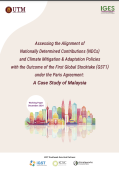This study conducts a valuation of non-marketed forest resources in Tanzania and proposes means for the generation of modified national accounts that would cover the full value of forest resource production and consumption. Land cover for the study area was studied for three points in time from 1975 to 1997. The study area was selected in accordance to Enumeration Areas (EAs) as listed for the 1988 Population Census. Flue-cured tobacco growing areas were purposefully selected for this study due to the nature of activities within them that are highly associated with the natural forests. Data was collected from a household survey of the study area as well as from relevant secondary sources.
The study showed that 63 percent of the respondents were regular growers of tobacco, a proportion that gives an indication of a high rate of depletion of the surrounding forests. An average cleared forest area for a new season of cultivation was found to be 4.7 ha per household. For the years 1975, 1987, and 1997, land cover analysis showed that woodland covered 60, 46, and 39 percent, respectively, of the land in the study area.
The study also found that the collection of forest resources for a typical household was influenced by its income, size, time to reach collection area, and the total area owned for farming. The total value of natural forests products consumed per household was estimated at $2,098, while value per person was $350. However, the value per household, considering products used for tobacco curing alone, was estimated at $662, or approximately 32 percent of the total value per household per annum. The magnitude of this proportion suggests that there is a strong need of revising the methods used for production of tobacco in this particular area and all others in the country that grow tobacco in a similar way, if the forests are to be preserved.
Finally, the study recommends some policies that would ensure regular delivery of data from governmental departments, which would facilitate natural resources accounting (NRA) and regular updates. This would allow environmental accounting to be part of the planning processes in the country.


